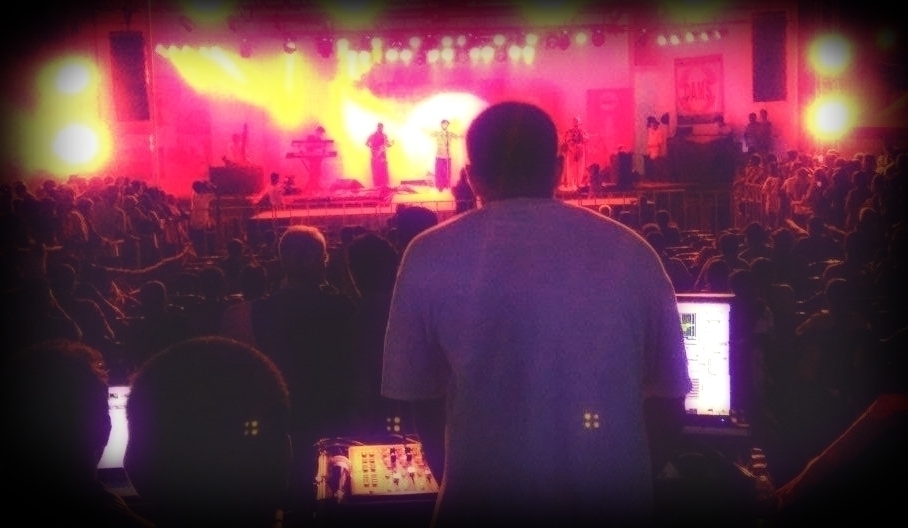[vc_row][vc_column width=”2/3″ css=”.vc_custom_1461585051858{background-color: #ffffff !important;}”][vc_column_text]If you have always been the guy who never misses a concert and yet has eyes mostly on the man behind the controls, then this article is for you. Often shrouded in anonymity, the live sound engineer is the one behind the scenes ensuring that the show sounds fantastic.
To understand what it means to be a live sound engineer and what a typical gig entails, we decided to get the lowdown from Niranjan Shivaram. With over a decade’s experience in the industry, his enviable client list includes names such as Swarathma, The Raghu Dixit Project, Thermal and a Quarter and Avial. Besides recording and mixing their music, he is also the name these top bands have on call as their live sound engineer.[/vc_column_text][vc_single_image image=”1039″ img_size=”full” add_caption=”yes” alignment=”center” onclick=”link_image”][vc_column_text]
PRE-GIG
Unlike recording in the studio, where you have the chance for a redo, and even change your microphone midway, live sound means you get just one chance to get it all right.
It all begins once the band has booked the venue. I get the technical requirements and then go about getting the equipment from the vendors. This has to be carefully managed because most vendors want to give you the equipment that they have, rather than what the band demands and needs for their gig. Another very important aspect at this stage is the budget and it determines what equipment I can lay my hands on. Depending on the budget available, either the band needs to compromise or the vendor needs to compromise. Rarely is the scenario one where everyone wins.[/vc_column_text][vc_column_text]

Begining to set-up
SET-UP
Once I get to the venue, setting up for the performance begins. Depending on where the gig is, even language can be a problem. Sometimes I am lucky and I get some of the
locals to help me translate so I can set up. Technical know-how is also not a given. In very small towns for instance, I need to get very hands-on to solve technical problems because the technicians at the venue might not even know what to do.[/vc_column_text][vc_column_text]
THE PERFORMANCE

Applying Knowledge of Engineering
Live sound at a performance always has the element of surprise. You have to be extremelyfocused and be able to deliver under any kind of circumstance. While I may know the ins and outs of setting up sound for the band I travel with, the opening act might be a local one which I have never even met. So I have to quickly figure out a way to make their show sound great.
Then of course, there are all the other challenges— from reducing the pickup of unwanted sounds to maximising gain before feedback and working with gear that might have got shaken around during the travel, a live sound engineer has to learn to work around these hiccups at any point in time.
THE SKILLS
At the end of the day, having a great show also means it has been a great day for the sound engineer. There is no better feeling in the world. These skills come through practice, whether it is the ability to judge sound quality, the patience, stamina and the concentration required or the sense of pitch, timing and rhythm.[/vc_column_text][vc_row_inner][vc_column_inner][vc_column_text css=”.vc_custom_1481715596913{padding-top: 10px !important;padding-right: 10px !important;padding-bottom: 10px !important;padding-left: 10px !important;background-color: #ffffff !important;}”]
THE UPS & DOWNS
While I cannot imagine doing anything else and enjoying it so much, being a live sound engineer also means taking flights

The Live Sound Life
at all hours, early morning starts and really late nights. Since the sound engineer also has to be present for rehearsals, sound checks and maintenance, this can mean multiple days with early starts and a late end. Prepare to be bleary eyed! Working on weekends is very common. I quickly picked up the ability to cope with long hours. On the positive side, you get to travel to the most beautiful places, hang out with talented musicians and amazing bands and try out different types of food.
Live sound engineers don’t get redos or retakes nor can they change their mind about equipment selection halfway through the gig. However, they get to work in a very rewarding space with talented artists and use their skills to give the audience the best ever concert experience.
Interested? Get in touch and we will show you can be one of them.
At Audio Academy we work with Producers from the industry and ensure your are mentored throughout the process while you pursue our Production course. From real world projects to assisting a producer on commercial assignments we see you through it all.
We’d be open for a detailed chat over a cup of tea at our office where you will also get to interact with faculty, and students to get a better understanding of whether this really is your calling.[/vc_column_text][/vc_column_inner][/vc_row_inner][/vc_column][vc_column width=”1/3″][vc_empty_space height=”450px”][vc_custom_heading text=”Contact Audio Academy” font_container=”tag:h4|text_align:left|color:%23ffffff” use_theme_fonts=”yes”][/vc_column][/vc_row]

